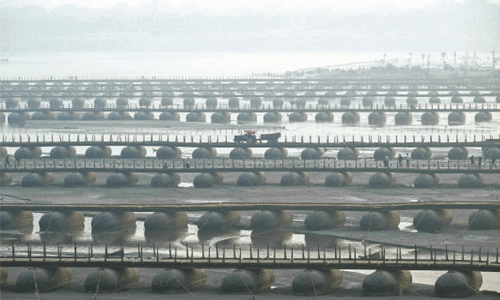
ISLAMABAD: The agriculture sector posted a meagre growth of 0.85 per cent against projected target of 3.8pc for the outgoing fiscal year, the Pakistan Economic Survey 2018-19 released on Monday showed.
The under-performance of agriculture sector hinged upon reduction in the area of cultivation, lower water availability and drop in fertiliser offtake. The crops sector witnessed negative growth of 4.43pc against the target of 3.6pc on the back of decline in growth of important crops by 6.55pc.
Sugarcane production declined by 19.4pc to 67.174 million tonnes; cotton declined by 17.5pc to 9.861m bales; and rice declined by 3.3pc to 7.202m tonnes, while production of maize crop increased by 6.9pc to 6.309m tonnes and production of wheat crop marginally increase by 0.5pc to 25.195m tonnes.
Other crops having share of 11.21pc in agriculture value addition and 2.08pc in GDP showed growth of 1.95pc mainly due to increase in production of pulses and oilseeds. Cotton ginning declined by 12.74pc due to decrease in production of cotton crop.
On the other hand, livestock recorded a growth of 4.0pc against the target of 3.8pc. Fisheries sector having share of 2.10pc in agriculture value addition, grew by 0.79pc, while forestry sector having share of 2.10pc in agriculture grew by 6.47pc due to increase in timber production in Khyber Pakhtunkhwa.
The production of onion and chilies witnessed an increase of 2.0pc to 2,120 tonnes and 0.4pc to 148,700 tonnes, respectively. However, the production of pulse lentil, moong, potato decreased by 5.5pc, 3.45pc and 0.3pc respectively compared to last year’s production. The total availability of water for the Kharif crops 2018 recorded 59.6 million acre feet (MAF) of water, reflecting a shortage of 11.2pc against the average system usage of 67.1 MAF and by 14.9pc as compared to Kharif 2017.
The survey attributed the drop in fertiliser offtake to the high prices of the input despite subsidy from the government during fiscal year 2018-19.
The survey listed ten initiatives of the government under the Prime Minister’s Agriculture Emergency Programme and stated that these initiatives would supplement the efforts of the government to improve productivity of major crops.
Published in Dawn, June 11th, 2019














































